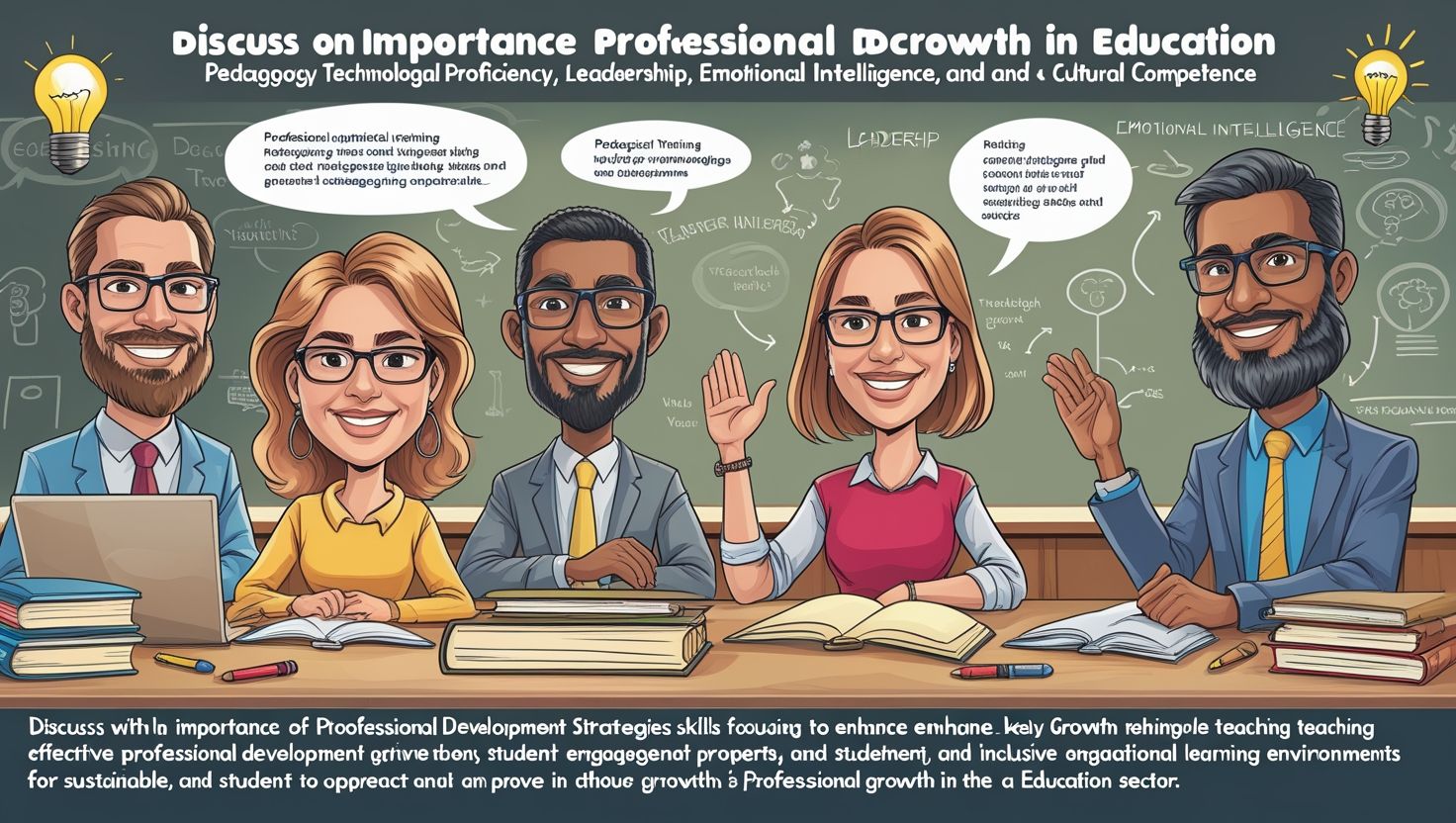Introduction
Professional Development Skills in Education, Professional development in education is a continuous process that equips educators with the necessary skills, knowledge, and competencies to enhance teaching effectiveness and student learning outcomes. In the rapidly evolving educational landscape, teachers must engage in lifelong learning to adapt to new pedagogical strategies, technological advancements, and diverse student needs. Effective professional development fosters reflective practice, collaboration, and innovation, ensuring that educators remain current with best practices. This article explores key professional development skills in education, including pedagogical training, technological proficiency, leadership development, emotional intelligence, and cultural competence. In addition, cultivating these skills, educators can improve instructional quality, foster inclusive learning environments, and contribute to systemic educational improvements.
Pedagogical Training and Instructional Strategies
One of the most critical professional development skills in education is advanced pedagogical training, which enables teachers to refine their instructional methods. Effective pedagogy involves understanding differentiated instruction, active learning techniques, and assessment strategies that cater to diverse learning styles. Professional development programs should emphasize evidence-based teaching practices, such as project-based learning, flipped classrooms, and formative assessments. Additionally, educators must stay informed about cognitive science research to optimize lesson planning and student engagement. Workshops, peer observations, and mentorship programs can facilitate the exchange of innovative teaching strategies. By continuously improving their pedagogical skills, teachers can enhance student comprehension, critical thinking, and academic achievement, ultimately fostering a more dynamic and effective learning environment.
Technological Proficiency and Digital Literacy
With the increasing integration of technology in education, teachers must develop strong digital literacy skills to enhance instruction and student engagement. Professional development should focus on utilizing learning management systems (LMS), educational apps, and interactive tools such as virtual reality (VR) and artificial intelligence (AI). Training programs should also address cybersecurity, digital equity, and responsible technology use to ensure safe and inclusive digital learning environments. Educators must be adept at blending traditional and digital teaching methods to accommodate hybrid and remote learning models. Furthermore, staying updated on emerging edtech trends allows teachers to personalize instruction and provide real-time feedback. Furthermore, mastering technological tools, educators can create more interactive, accessible, and student-centered classrooms, preparing learners for a digitally driven future.
Leadership and Collaborative Skills
Professional development in education should also emphasize leadership and collaboration, as these skills are essential for school improvement and teacher empowerment. Instructional leaders, such as department heads and mentor teachers, play a crucial role in guiding curriculum development and fostering a culture of continuous improvement. Effective professional learning communities (PLCs) encourage collaborative problem-solving, data-driven decision-making, and peer coaching. Leadership training should also focus on conflict resolution, team-building, and change management to help educators navigate institutional challenges. By developing strong leadership skills, teachers can advocate for policy changes, mentor new educators, and contribute to school-wide initiatives that enhance educational quality. Collaborative professional development ensures that knowledge is shared, innovation is encouraged, and collective goals are achieved.
Emotional Intelligence and Student Well-being
Emotional intelligence (EI) is a vital professional development skill that enables educators to manage classroom dynamics, build strong student-teacher relationships, and support student well-being. Teachers with high EI can recognize and respond to students’ emotional needs, reducing stress and improving engagement. Professional development programs should include training in empathy, active listening, and trauma-informed teaching practices to address mental health challenges in the classroom. Additionally, educators must develop self-regulation and resilience to manage their own stress and prevent burnout. By fostering emotional intelligence, teachers can create a supportive and inclusive classroom environment where students feel valued and motivated to learn. This skill is particularly crucial in addressing behavioral issues and promoting social-emotional learning (SEL) in schools.
Cultural Competence and Inclusive Education
In an increasingly diverse educational landscape, cultural competence is a key professional development skill that ensures equitable learning opportunities for all students. Teachers must be trained to recognize and address biases, adapt curricula to reflect multicultural perspectives, and implement culturally responsive teaching strategies. Professional development should include workshops on language diversity, socioeconomic disparities, and inclusive pedagogy to meet the needs of marginalized student populations. Educators must also engage in self-reflection to understand their own cultural assumptions and improve cross-cultural communication. By developing cultural competence, teachers can foster an inclusive classroom environment where all students feel respected and empowered. This skill is essential for closing achievement gaps and promoting educational equity.
Conclusion
Professional development in education is a multifaceted process that requires continuous learning and skill enhancement. By focusing on pedagogical training, technological proficiency, leadership development, emotional intelligence, and cultural competence, educators can improve their instructional effectiveness and student outcomes. High-quality professional development programs should be ongoing, collaborative, and research-based to ensure meaningful growth. As the demands of education evolve, teachers must remain adaptable and committed to lifelong learning. Investing in professional development not only benefits individual educators but also strengthens the entire educational system, leading to improved teaching practices, equitable learning opportunities, and long-term student success. Schools and policymakers must prioritize sustainable professional development initiatives to support educators in their mission to inspire and empower future generations.

After all, what a great site and informative posts, I will upload inbound link – bookmark this web site? Regards, Reader.
This really resonates with my own experience. I especially appreciated how the points are made clear. Thanks for sharing your insights!